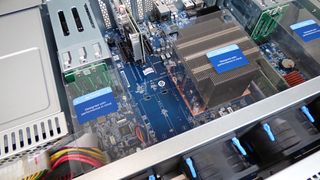IT Pro Verdict
Pros
- +
Good value
- +
30 SSDs in 2U
- +
AMD Ryzen CPU
- +
DDR5 memory
- +
Top 25GbE performance
- +
QuTS hero OS
- +
High expansion potential
Cons
- -
Nothing of note
Qnap has been steadily making inroads into the enterprise all-Flash array (AFA) market and the Qnap TS-h3077AFU offers budget-conscious businesses an SSD-dense solution at a price they can afford. To keep the base price on the right side of £5K, the appliance supports lower-cost SATA SSDs but the smart combination of front and rear cages allows it to present an impressive 30 SFF bays in only 2U of rack space
The chassis bears many similarities to Qnap's older Xeon W-1200 equipped TS-h3088XU-RP as it also has 24 front SFF bays and six more at the back split into two groups. It's a very different story inside though, as the TS-h3077AFU is available with a 6-core AMD Ryzen 5 7000 CPU or as with our review system, an 8-core 3.8GHz Ryzen 7 7745 with a 5.3GHz boost speed.
Memory sees big improvements as you have a choice of 32GB or 64GB of fast DDR5 and this can be upgraded to a very usable 192GB using 48GB UDIMMs. Network options look good as the appliance presents dual embedded 2.5GbE and 10GbE RJ45 ports which are all the multi-Gigabit variety.
There's plenty of room for more as three vacant PCIe Gen4 expansion slots are available and Qnap offers a good choice of 2.5, 10, 25, and 100GbE cards. Alternatively, you can use them with Qnap's expansion cards and attach up to eight external disk shelves with the 24-bay TL-R2400PES-RP adding a maximum of 192 extra drives.
Qnap TS-h3077AFU review: Hardware and design
Internally, it's all nice and tidy with the Ryzen CPU mounted by an impressively large passive heatsink. Four long DIMM slots sit to the right with two occupied by 32GB DDR5 UDIMM modules leaving room to upgrade to 128GB without having to replace them.

Cable clutter is kept to a minimum as the two rear triple-bay cages are connected directly to edge connectors on the motherboard. Internal cooling is handled by four cold-swap fans fitted in a removable tray positioned behind the drive backplane and three small air shrouds are used to direct air through the rear cages plus the centrally mounted CPU.
Qnap TS-h3077AFU review: 25GbE performance
For 25GbE performance testing, we fitted a Qnap dual-port 25GbE card in the appliance and another in a Dell PowerEdge R650xs Xeon Scalable rack server running Windows Server 2022. Over at the appliance, we created a RAID10 data pool from the WD Red SSDs and mapped a NAS share to the server over a 1-meter SFP28 DAC (direct attach cable).

NAS performance is excellent with the share returning Iometer sequential read and write rates of 23.1Gbits/sec and 22.6Gbits/sec while random operations delivered rates of 23.1Gbits/sec and 22.7Gbits/sec. To test IP SAN performance, we created a 500GB iSCSI LUN and mapped it to the server over a single 25GbE connection. Our test results were almost identical to the NAS speeds with only random write rates dropping very slightly to 22.4Gbits/sec.
We ramped up the pressure with a dual 25GbE MPIO link to the target and saw IP SAN performance almost double across the board. Iometer reported raw sequential read and write rates of 46.2Gbits/sec and 46Gbits/sec while random operations returned 46.1Gbits/sec and 40.8Gbits/sec.
Swapping to 4KB block sizes saw good I/O throughput as after leaving each test running for an hour, we recorded sequential read and write throughputs of 266,900 and 257,500 IOPS. Changing to random operations returned read and write rates of 266,200 and 148,100 IOPS.
Qnap TS-h3077AFU review: QuTS hero features
The 'h' in the model indicates that this appliance is geared up for Qnap's QuTS hero OS. It comes with a large amount of base memory for good reason as the OS requires at least 16GB for its inline data deduplication feature and 32GB to get the best performance from 10GbE and faster connections.
It offers far more data integrity features than the more nimble QTS OS with its ZFS copy-on-write offering fast, almost unlimited snapshots of NAS shares and iSCSI LUNs and options to encrypt both NAS shares and iSCSI LUNs. End-to-end checksums provide self-healing of data corruption and you have triple parity RAID to protect against three drive failures or triple mirroring which stores identical copies of data on three drives.

Ransomware protection comes into play with NAS shares as you can apply one of two WORM (write once, read many) policies. These protect shared folders from malicious or accidental deletion and stop the data within them being modified or removed.
Choose RAID5, 6, 50, 60, or Triple-Parity arrays and Qnap's patented QSAL (Qnap SSD antiwear leveling) comes into play. This sets different levels of over-provisioning on each SSD in the array to avoid multiple device failures occurring simultaneously.
Qnap TS-h3077AFU review: Is it worth it?
Absolutely – a price tag of around £5,500 for the TS-h3077AFU-R7-64G model we have on review makes it exceedingly good value. It's in a league of its own too, as no other vendor offers a 2U 30-bay all-Flash array and it comes with a powerful hardware specification, a very high memory capacity, and plenty of room for further expansion.
The appliance may only support SATA SSDs but we found NAS and IP SAN performance over 25GbE to be up there with more costly alternatives. And with Qnap's QuTS hero OS at the helm, it won't be found wanting for enterprise-class data protection and storage-saving features.
Qnap TS-h3077AFU specifications
| Chassis | 2U rack chassis |
| CPU | 3.8GHz 8-core AMD Ryzen 7 7745 |
| Memory | 64GB DDR5 UDIMM (max 192GB) |
| Storage | 30 x SATA SFF hot-swap |
| RAID | RAID0, 1, 5, 6, 10, 50, 60, Triple Mirror, Triple Parity |
| Expansion | 3 x PCIe Gen 4 |
| Network | 2 x 2.5GbE, 2 x 10GbE RJ45 (all multi-Gigabit) |
| Other ports | 2 x Type-A USB 3.2 Gen 2 |
| Power | 2 x hot-plug 550W PSUs |
| Management | Web browser |
| Warranty | 5 years limited |
Dave is an IT consultant and freelance journalist specialising in hands-on reviews of computer networking products covering all market sectors from small businesses to enterprises. Founder of Binary Testing Ltd – the UK’s premier independent network testing laboratory - Dave has over 45 years of experience in the IT industry.
Dave has produced many thousands of in-depth business networking product reviews from his lab which have been reproduced globally. Writing for ITPro and its sister title, PC Pro, he covers all areas of business IT infrastructure, including servers, storage, network security, data protection, cloud, infrastructure and services.

